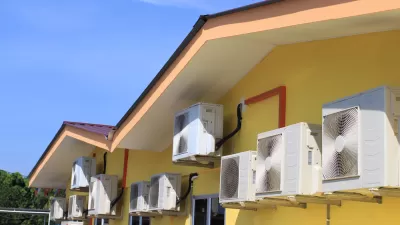Matt Bevilacqua found much to cheer in the 'renewed focus on urbancentric topics' that President Obama delivered in his second inaugural address. Climate change, immigration, and inequality were among the speech's primary topics.
"During this morning’s inauguration ceremony, Obama touched upon several domestic topics — including investments into sustainable industries — that should have urbanists and urban dwellers perking up their ears," says Bevilacqua. "Though light on specifics, the issues spotlighted today will likely set at least part of the executive agenda for the next four years."
He identified immigration as one issue given attention by Obama that could have significant policy implications for cities. "In a much more direct way than at the last inauguration," notes Bevilacqua, "Obama took a pro-immigration stance, casting it as a workforce development issue."
By far though, the specific issue getting the most attention in his address was climate change, answering questions about whether the issue was among the President's priorities for his second term, write Richard W. Stevenson and John M. Broder in The New York Times. " made addressing the most prominent policy vow of his second Inaugural Address on Monday, setting in motion what Democrats say will be a deliberately paced but aggressive campaign built around the use of his executive powers to sidestep Congressional opposition."
“'We will respond to the threat of climate change, knowing that failure to do so would betray our children and future generations,' Mr. Obama said, at the start of eight full sentences on the subject, more than he devoted to any other specific area. 'Some may still deny the overwhelming judgment of science, but none can avoid the devastating impact of raging fires, and crippling drought, and more powerful storms.'”
Stevenson and Broder previewed some of the administrative maneuvers the President plans to utilize to avoid going through Congress. These include: "[reducing] emissions from power plants, [increasing] the efficiency of home appliances and [having] the federal government itself produce less carbon pollution."
Another good sign for environmentalists: Vice President Joe Biden made a surprise appearance at the Green Inaugural Ball, to say thanks and declare that his "green dream" is that "we finally face up to climate change."
FULL STORY: For Obama, A Renewed Focus on Urbancentric Topics

Alabama: Trump Terminates Settlements for Black Communities Harmed By Raw Sewage
Trump deemed the landmark civil rights agreement “illegal DEI and environmental justice policy.”

Planetizen Federal Action Tracker
A weekly monitor of how Trump’s orders and actions are impacting planners and planning in America.

The 120 Year Old Tiny Home Villages That Sheltered San Francisco’s Earthquake Refugees
More than a century ago, San Francisco mobilized to house thousands of residents displaced by the 1906 earthquake. Could their strategy offer a model for the present?

In Both Crashes and Crime, Public Transportation is Far Safer than Driving
Contrary to popular assumptions, public transportation has far lower crash and crime rates than automobile travel. For safer communities, improve and encourage transit travel.

Report: Zoning Reforms Should Complement Nashville’s Ambitious Transit Plan
Without reform, restrictive zoning codes will limit the impact of the city’s planned transit expansion and could exclude some of the residents who depend on transit the most.

Judge Orders Release of Frozen IRA, IIJA Funding
The decision is a victory for environmental groups who charged that freezing funds for critical infrastructure and disaster response programs caused “real and irreparable harm” to communities.
Urban Design for Planners 1: Software Tools
This six-course series explores essential urban design concepts using open source software and equips planners with the tools they need to participate fully in the urban design process.
Planning for Universal Design
Learn the tools for implementing Universal Design in planning regulations.
Clanton & Associates, Inc.
Jessamine County Fiscal Court
Institute for Housing and Urban Development Studies (IHS)
City of Grandview
Harvard GSD Executive Education
Toledo-Lucas County Plan Commissions
Salt Lake City
NYU Wagner Graduate School of Public Service





























